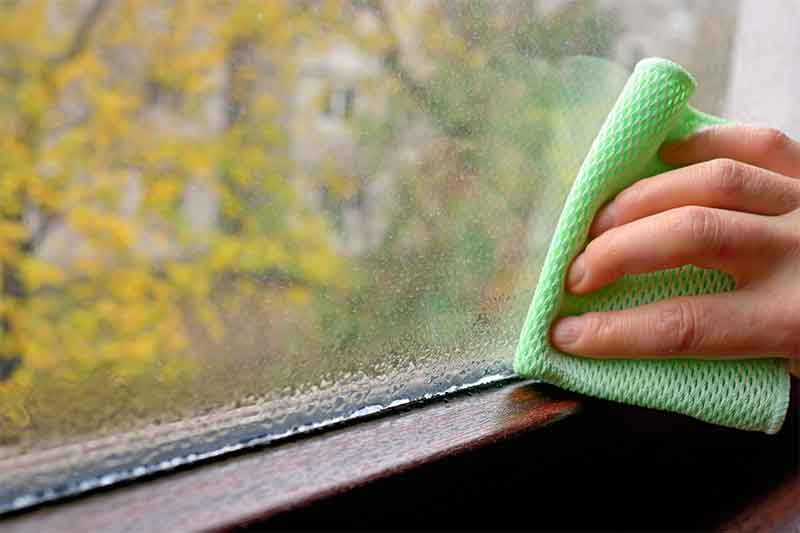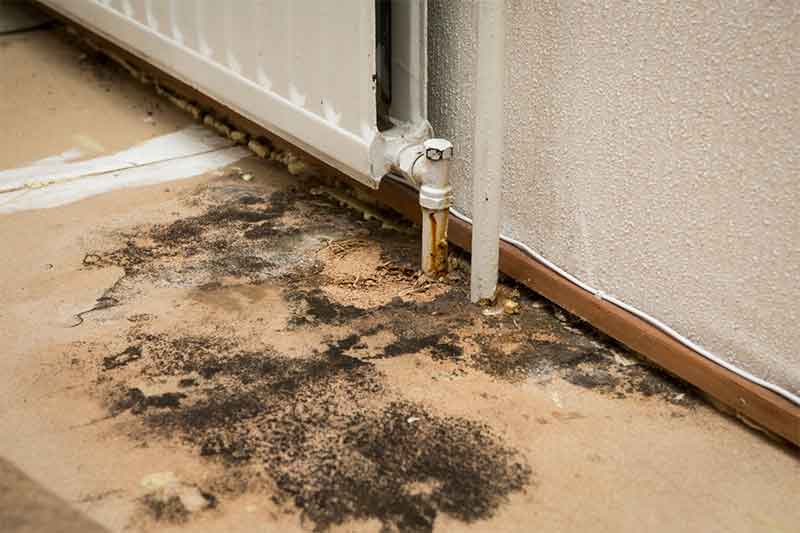You have a mold problem and you’re at the end of your rope. You have cleaned, scrubbed, and even painted over the mold, but it always seems to come back. Mold can be relentless.

If you have tried everything (including the advice on our Mold Prevention Checklist) and the mold still returns, it may be time to hire a professional. But before you do, there are a few red flags to be aware of.
Companies that perform Mold Services vary greatly in terms of qualifications, knowledge, and principles. Read on to make sure you are choosing the most qualified mold company to help resolve your mold problem.
 Red Flag #1: Addressing the mold but not the moisture.
Red Flag #1: Addressing the mold but not the moisture.
When water penetrates the indoor environment, mold usually finds everything it needs to thrive: mild temperature, humidity, oxygen, and organic matter.
Most indoor molds will grow when
- moisture content is greater than 20% and
- relative humidity is above 60% and
- the room temperature remains above 68° F.
If you clean the visible mold, but the source of moisture is left unaddressed, the mold will most likely return.

Anyone working in the mold industry should know that finding and fixing the moisture source is the key to resolving an indoor mold issue. As the customer, make sure you are hiring a reputable, knowledgeable mold professional (see Red Flag #3) who understands the underlying causes of mold growth, and be sure to ask a lot of questions before scheduling their visit (see Red Flag #4).
 Red Flag #2: Assessment, Remediation and Conflict of Interest
Red Flag #2: Assessment, Remediation and Conflict of Interest
While it is not always common knowledge to the public, there is a big difference between a Mold Assessment and Mold Remediation, and companies who stand to profit from doing both on a given project are in violation of a well-known code of ethics among Indoor Environmental Professionals (IEPs).
This code has emerged due to an increasing number of unscrupulous individuals deliberately inflating project costs to first investigate and then remediate a mold problem solely for their own profit. There are many instances in which a customer needing a small patch of drywall replaced, for example, was instead quoted thousands for a major kitchen renovation by a “Mold Professional” looking to make a windfall off the consulting and remediation work.
It is recommended in cases of recurring mold that a professional mold assessment be performed separately, and prior to any remediation work. While this will add cost to your project up front, in most cases it will actually save you a lot of money in the long run.
 As mentioned earlier, cleaning visible mold is one thing, but having a scientific, detailed report outlining the underlying causes of your mold issue can be worth its weight in gold. Ask the couple who skipped a mold assessment, paid thousands for mold removal and renovations, only to later discover (when the mold returned) that the mold was being caused by a leaking pipe behind the drywall.
As mentioned earlier, cleaning visible mold is one thing, but having a scientific, detailed report outlining the underlying causes of your mold issue can be worth its weight in gold. Ask the couple who skipped a mold assessment, paid thousands for mold removal and renovations, only to later discover (when the mold returned) that the mold was being caused by a leaking pipe behind the drywall.
A certified mold assessor with a moisture meter would have found the pipe issue and highlighted the leak fix as the crucial first step in the remediation plan, saving this client a lot of money and added stress.
In addition to having the tools, training, and experience to find sources of moisture and related issues, a certified mold consultant will provide you with a detailed “Scope of Work” which can then be used to seek bids from remediation firms.
Red Flag #3: No Certifications
In many parts of the US, a person without any related training or experience can set up a website, print some business cards and claim to be a “mold expert.” An untrained person who attempts to resolve an indoor mold issue could be putting the health of anyone who enters that environment at risk, especially when Stachybotrys (black mold) is present.
One way to distinguish between qualified IEPs and those with inadequate training is to ask about their certifications, experience, and industry affiliations.
Two of the more well-known certification programs in the United States are the American Industrial Hygiene Association (AIHA) and American Council for Accredited Certification (ACAC). To help consumers find a reputable IEP, ACAC has created a searchable database of its nationwide certificants, which is updated regularly. Click here to find a certified IEP in your area.
It should be noted that there are some very knowledgeable folks in the mold industry who, for one reason or another, have not completed a mold certification program. However, hiring someone with ACAC or similar credentials provides you with the assurance that the individual has the endorsement of a highly regarded industry organization.

Red Flag #4: Some mold ‘Pros’ just don’t know the FAQs.
Before you hire anyone to help with your indoor mold issue, be sure to ask a lot of questions of the companies you are considering. Qualified IEPs will not hesitate to provide this information up front, and if the company you are considering is not able to provide you with adequate answers to your questions, we would advise you to keep searching.
Here are some suggested questions you may want to ask before hiring a mold professional:
- Are you affiliated with or certified through ACAC, AIHA, IICRC, IAQA, or a similar respected industry organization?
- What do I get for the fee I am paying you?
- Are you going to conduct a physical inspection of my home?
- Will you inspect the air handling units (if applicable)?
- Are you going to take air and surface samples? (taking samples is not always necessary; a good IEP will advise and explain).
- Will I get a written report, and what will it include?
- Will there be a Scope of Work specifying how to clean up the mold?
- How is the moisture intrusion going to be corrected?
- Are you going to investigate or resolve the moisture issue?*
- For consultants: Can you provide references for reputable mold remediation firms?*
- For remediation firms: Can you provide references for reputable mold investigation/consulting firms?*
*(remember, if they say, “we’ll do both”: Red Flag!) - Do you recommend follow-up protocols such as “Clearance Testing” or “Post Remediation Verification?” for my particular problem?
Red Flag #5: Mold Report missing or incomplete.
When the initial mold investigation is complete, the IEP should write up a thorough report detailing the summary of the project, the findings of the mold investigation, the lab report (if samples were taken), and the IEP’s professional conclusions and recommendations, with remediation planning guidance in a Scope of Work, if applicable.

Professional Indoor Air Quality reports will usually follow an outline similar to the following:
- Introduction (name, location, description of the problem, etc.)
- Observations
- Indicator Measurements
- Sampling
- Conclusions & Recommendations
- References
A professional Mold Report is a thorough, detailed document outlining the entire mold investigation, explaining visual observations, scientific data, conclusions, and recommendations for resolution. If the company you are considering says they will not provide written documentation to stand behind their work, it may be time to find another company.
Conclusion
The mold industry is largely unregulated and quite complex. A poorly managed indoor mold problem comes with big financial and health risks. Professionally trained Indoor Air Quality (IAQ) professionals are often called in to resolve mold issues after the homeowner or building manager has already tried, and failed, to resolve the issue themselves. Being an informed consumer is always your best bet, and hopefully the information provided here will help ensure that when hiring a mold professional, your mold problem gets resolved correctly.
Here are some great resources related to mold guidelines and mold professionals:
Search for an ACAC Certified Professional: https://www.acac.org/find
OSHA Mold Guidelines: http://www.osha.gov/SLTC/molds/
US EPA Guidance Documents for Mold: https://www.epa.gov/mold/publications-about-mold
American Council for Accredited Certification (ACAC): www.acac.org
American Industrial Hygiene Association (AIHA): www.aiha.org

